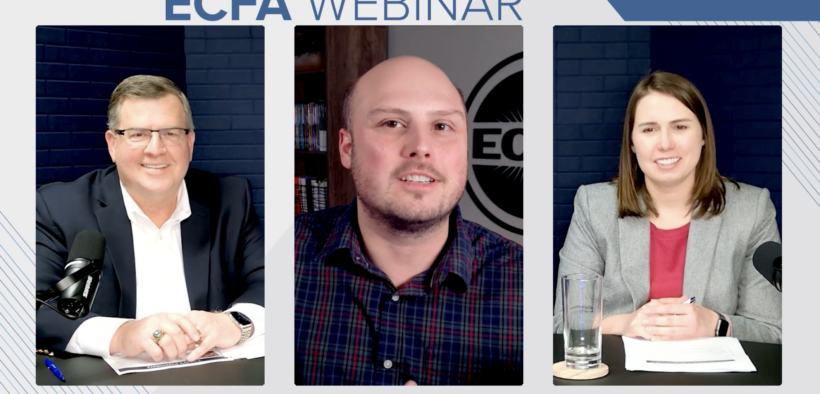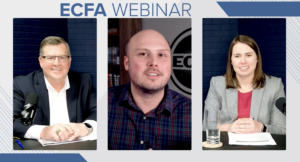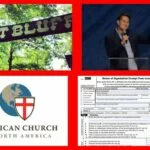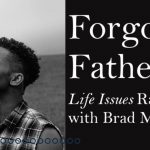ECFA Lists Tax & Legal Developments for 2025
Updates may reshape how churches, ministries handle charitable giving, compliance, governance

The Evangelical Council for Financial Accountability (ECFA) has released a 27-page document listing a wide range of federal tax and legal updates for churches, ministries, and other nonprofit organizations in 2025. The ECFA predicts the updates may shift how groups manage charitable giving, regulatory compliance, and organizational governance.

“Federal Tax Update for Churches and Ministries” webinar from ECFA / Video screenshot
Many eyes are on the expiring provisions of the 2017 Tax Cuts and Jobs Act (TCJA), which significantly changed federal tax law. The report says the TCJA represented the most significant federal tax law overhaul in over 30 years. If Congress does not take action by the end of 2025, key elements such as the higher standard deduction, the 60%-of-AGI limit for charitable cash contributions, and the doubled estate and gift tax exemption will revert to pre-2018 levels, roughly about half of its current amount.
The report predicts that the new administration will likely prolong or expand many key elements of the TCJA. It also notes that statements from President Trump’s team suggest the potential for more radical tax reforms—potentially extending, expanding, or replacing existing provisions altogether.
For example, a compilation of articles entitled “Mandate for Leadership: The Conservative Promise” as part of Project 2025 includes recommendations for the Treasury to work with Congress to simplify the tax code by implementing a two-tier individual tax system at 15% and 30% that “eliminates most deductions, credits, and exclusions.” It also advocates reducing the federal corporate income tax rate from 21% to 18 percent.
The ECFA also lists uncertainty related to the Corporate Transparency Act (CTA), which requires certain business entities to disclose “beneficial owners” to the Financial Crimes Enforcement Network (FinCEN).
Although religious institutions and 501(c)(3) charities are exempt, any affiliated for-profit subsidiaries may be subject to reporting. ECFA reported that a federal court temporarily blocked the CTA’s enforcement in December 2024, leaving FinCEN to classify filings as voluntary until appeals are resolved.
However, there have been updates since ECFA published the report.
On February 18, the U.S. District Court for the Eastern District of Texas stayed the nationwide preliminary injunction on the CTA, reinstating the mandatory beneficial ownership reporting requirements and prompting FinCEN to extend the filing deadline to March 21, 2025, for most reporting companies. Newly formed or registered entities after February 19, 2025, must file within 30 days.
The report also says that although the SECURE 2.0 Act took effect in late 2022 and allows employees to treat employer-matching contributions as Roth (after-tax), many employers and plan administrators have delayed implementing this option. They cite ongoing uncertainty around IRS guidance and plan document updates as primary reasons for the delay.
New IRS proposed regulations under SECURE 2.0 would require employers establishing new 401(k) or 403(b) plans after December 29, 2022, to automatically enroll eligible employees, but these mandates do not apply to church plans.
Retirement plan experts note that offering employer Roth contributions typically requires amending plan documents, and although recent IRS guidance permits such contributions now (with amendments allowed until December 31, 2026), many plan administrators are still hesitant.
A broader requirement that new 401(k) or 403(b) plans automatically enroll employees does not apply to church plans, but it could still influence how nonprofit organizations structure their benefits.
On January 10, 2025, the IRS proposed new rules requiring certain high-income participants to make retirement plan catch-up contributions as Roth. However, the IRS has postponed implementing this requirement until 2026.
Access to MinistryWatch content is free. However, we hope you will support our work with your prayers and financial gifts. To make a donation, click here.
Proposed legislation known as the “Clergy Act” would allow ministers who previously opted out of Social Security for religious reasons a one-time opportunity to rejoin the system. This would address concerns that many later regret losing access to Social Security and Medicare benefits.
On the energy front, the ECFA reports that the Inflation Reduction Act now extends certain clean-energy tax benefits to historically ineligible nonprofits. Through an “elective payment election,” organizations can receive direct refunds on tax credits for qualifying projects—ranging from solar or other renewable power installations to purchasing electric vehicles. This provision and the ability to assign energy-efficient building deductions to contractors are part of the Act’s aim to help religious institutions, schools, and other nonprofits reduce energy costs if they can navigate the technical requirements.
The latter part of the ECFA’s report lists five bills in Congress they say could either expand or constrain nonprofit activities: The Foreign Grant Reporting Act, Stop Terror-Financing and Tax Penalties on American Hostages Act, No Foreign Election Interference Act, American Donor Privacy and Foreign Funding Transparency Act, and the Education and Workforce Freedom Act.
The EFCA says that some proposals focus on halting terrorist financing by tightening oversight of foreign grants, prompting worries about disclosing the personal details of overseas partners. Others aim to protect donor privacy, especially regarding foreign contributions, while a separate measure would require public reporting of foreign-sourced funding. Bills tied to political donations and 529 educational savings reforms may also subtly affect churches and charities.
The report also noted that donor-advised funds (DAFs) introduced in 2023 are drawing intense scrutiny from the IRS through proposed regulations that redefine terms like “donor advisor” and impose stricter compliance measures. According to the report, nonprofit leaders argue that these rules could deter giving and burden sponsors that already follow detailed Treasury requirements.
In parallel, a pivotal Supreme Court ruling in Loper Bright Enterprises v. Raimondo has ended the longstanding practice of automatically deferring to agency interpretations of ambiguous statutes. The ECFA says this shift may invite future legal challenges to other IRS regulations that nonprofits must follow.
The report includes the court’s challenges in applying federal discrimination laws to 501(c)(3) entities. In the Buettner-Hartsoe v. Baltimore Lutheran High School Association case, the Fourth Circuit found that merely holding tax-exempt status does not mean an organization “receives federal financial assistance” under Title IX.
In a separate dispute, the Supreme Court is hearing a case over whether a state can decide if a religious nonprofit is “religious enough” for unemployment-tax exemptions. The outcome could affect faith-based charities nationwide that perform services sometimes deemed too “secular” to merit an exemption.
On January 28, 2025, the EFCA conducted a two-hour webinar discussing the report’s details. The full report and the webinar recording, Federal Tax Update for Churches and Ministries, are available upon registration.
TO OUR READERS: Do you have a story idea, or do you want to give us feedback about this or any other story? Please email us: [email protected]








